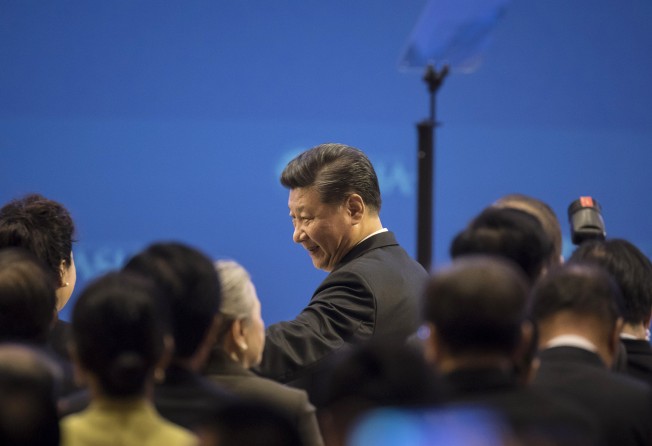At Boao, Xi Jinping shows the world a grown-up China amid trade war threats
Richard Harris says instead of engaging Donald Trump in a battle of one-upmanship, the Chinese leader demonstrated statesmanship by promising to further open up China’s economy, in the interests of trade and globalisation

Boao, in Hainan, is about as far away climatically from Davos, in Switzerland, as you can get. Moving from cold and crisp to hot and sticky is a big step for regular economic conference groupies and, despite superficial similarities, the meetings are very different, too.
The World Economic Forum in Davos is an annual global jamboree attended by the great and the good, but the Boao Forum has a special significance because of its focus on China and the Chinese economy. It’s more like the US Federal Reserve’s annual symposium in Jackson Hole, Wyoming, where the focus is on the United States.
There is no more important time than the present to be looking at the Chinese economy, as US President Donald Trump’s trash talk on trade continues apace. The markets were spooked by some serious falls on the announcement of the first likely Trump tariff proposals. These were followed by Chinese retaliatory tariffs, and then a further US retaliation to the retaliation.
“Ya, boo, sucks” is not the finest way to conduct international diplomacy so most observers, including myself, who were watching President Xi Jinping expected that he would take the moral high ground, be reasonable and statesmanlike and would be shocked at the thought that there should be any restriction in globalisation or trade (that has served China particularly well). A positive comparison to Trump’s emotional approach was an easy shot.
Xi played the part perfectly – but there was a twist. He came out with an unexpectedly conciliatory manner, spending the first third of his speech appearing to talk to his own constituency at home in China about the need for domestic economic reform. Almost as if he was campaigning for election.
This is an important turning point. It is now 40 years since China opened up as a very poor developing economy, when other nations were prepared to give the country a huge amount of slack. Hundreds of millions of people spent two generations working to get out of poverty. China is now a major developed economy of global stature. Xi is perhaps the first president to recognise that China is way past being a developing teenager and now has to act its age on the world stage.
Xi is perhaps the first president to recognise that China is way past being a developing teenager and now has to act its age on the world stage
The size of the economy means that China is now not only a major economic trading partner but also an opponent and indeed adversary in world trade. The country can no longer demand a free ride. Yet barriers to imports and foreigners, more akin to a developing country, still exist.
No one can expect China to become an immediate convert to full free trade but the best way to identify a level playing field is to imagine that, by some strange fantasy, China was granted membership of the European Union. Out would go the state subsidies to failing companies, out would go state-sponsored oligarchies, out would go counterfeiting, out would go restricted foreign ownership, and out would go a currency carefully managed by the central bank.
The very high bar called “national interest” which restricts large areas of the economy to foreign influence would not go out – but it could be significantly lowered, and focused on defence and proprietary technology.
Xi the statesman is also Xi the pragmatist – for China is at a serious disadvantage to the US in a trade skirmish. As of December last year, according to US census data, 25 per cent of China’s exports go to the US (that’s 6 per cent of China’s gross domestic product); the US exports only 5 per cent to China (0.6 per cent of GDP).
The trade surplus between US imports, at US$130 billion last year, and exports, at US$505 billion, is less a badge of honour than an embarrassing millstone. Xi himself said that no country needs a surplus that big. China has to keep 40 per cent of its foreign reserves in US Treasury bonds (US$1.2 trillion). Try to sell those assets and you destroy your own savings.
Perhaps the biggest surprise of Xi’s speech was that he did not save face by just saying, “You’re not going to push us around”. On the contrary, Xi emphasised that China’s economy needs reform and pointed out that opening up would help both sides. More than that, global economies and stock markets thought it a pretty good idea, too.
America can still say talk is cheap – and reform takes a long time. There will be a period where Trump will have to trust, and verify. If Xi is able to open up the economy as dramatically as Deng Xiaoping did 40 years ago, by putting aside the concept of face, he will be close to grasping the cloak of global statesmanship.
Richard Harris is a veteran investment manager, banker, writer and broadcaster and financial expert witness. www.portshelter.com